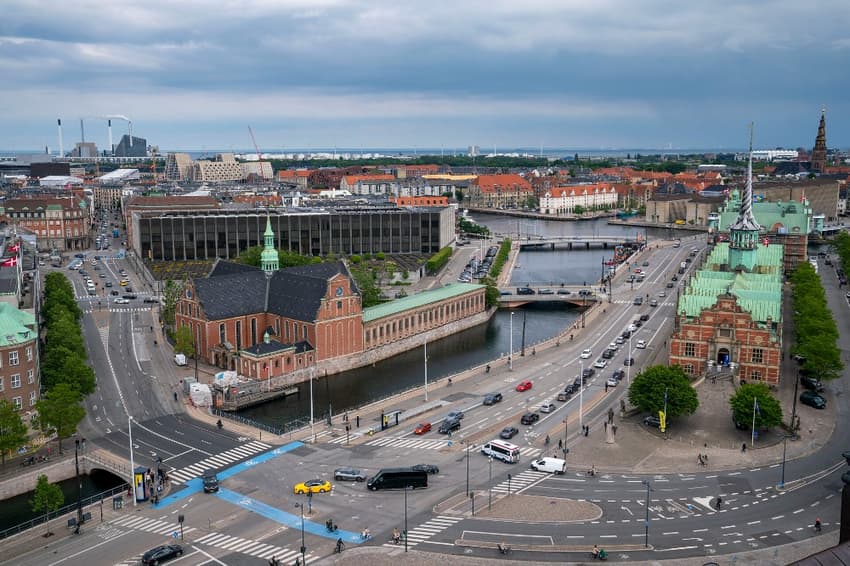Why has Denmark raised interest rates again with inflation falling?

Interest rates have been raised again in Denmark in line with an adjustment at the European Central Bank (ECB).
Denmark’s central bank Nationalbanken raised interest rates by 0.25 percent yesterday. The move followed the European Central Bank’s decision to raise its interest rate to 3.75 percent.
The new Nationalbanken rates mean that annual interest on deposits in Denmark is now at 3.35 percent, while interest on loans is 3.40 percent annually.
Nationalbanken generally follows the ECB’s course when it comes to interest rate adjustments, with both central banks making several upwards adjustments in recent months in response to inflation.
“Every time the ECB has put interest rates up over the last year, Nationalbanken has also raised interest. On two occasions the national bank made a slightly smaller increase than the ECB because the krone was too strong. That is not the case today,” the Confederation of Danish Industry’s senior economist Allan Sørensen said in a press statement.
Nationalbanken follows the ECB interest rate changes because of a political policy to keep the krone pegged to the euro. That is regulated by a number of methods including the interest rate.
READ ALSO: Dankort: What is Denmark’s payment card and how is it different from other card types?
Last year saw the ECB raise interest rates for the first time since 2011, with the leading rate at a record low level.
Following the Russian invasion of Ukraine and subsequent upsurge in energy prices and general inflation, the ECB – and Nationalbanken – began raising interest rates in order to reduce consumer spending and thereby temper spiralling prices.
“Inflation in Denmark has fallen more than in the Eurozone countries, but prioritisation is given to the fixed exchange rate. That is why Nationalbanken is raising the interest rate [again],” says Sørensen said.
Interest rates increased during the last autumn, winter and spring and have now continued into the summer. The most recent interest rate increase prior to this week was in June.
Inflation is meanwhile declining in Denmark but remains high. The so-called “core inflation”, a measure that doesn’t take into account energy prices and is regarded as an accurate depiction of how established inflation has become across the economy, is just under 5 percent, according to Sørensen.
High interest rates make it more expensive to borrow money. This particularly affects homeowners with variable interest rate mortgages and others with variable rate loans.
The Danish Chamber of Commerce sounded an optimistic note on Thursday despite the latest raise to the interest rate.
“We would prefer the interest rate to be raised on one more occasion, but if inflation continues to fall, the ECB will probably refrain from raising the interest rate further,” the organisation’s senior economist Kristian Skriver said in a statement.
Comments
See Also
Denmark’s central bank Nationalbanken raised interest rates by 0.25 percent yesterday. The move followed the European Central Bank’s decision to raise its interest rate to 3.75 percent.
The new Nationalbanken rates mean that annual interest on deposits in Denmark is now at 3.35 percent, while interest on loans is 3.40 percent annually.
Nationalbanken generally follows the ECB’s course when it comes to interest rate adjustments, with both central banks making several upwards adjustments in recent months in response to inflation.
“Every time the ECB has put interest rates up over the last year, Nationalbanken has also raised interest. On two occasions the national bank made a slightly smaller increase than the ECB because the krone was too strong. That is not the case today,” the Confederation of Danish Industry’s senior economist Allan Sørensen said in a press statement.
Nationalbanken follows the ECB interest rate changes because of a political policy to keep the krone pegged to the euro. That is regulated by a number of methods including the interest rate.
READ ALSO: Dankort: What is Denmark’s payment card and how is it different from other card types?
Last year saw the ECB raise interest rates for the first time since 2011, with the leading rate at a record low level.
Following the Russian invasion of Ukraine and subsequent upsurge in energy prices and general inflation, the ECB – and Nationalbanken – began raising interest rates in order to reduce consumer spending and thereby temper spiralling prices.
“Inflation in Denmark has fallen more than in the Eurozone countries, but prioritisation is given to the fixed exchange rate. That is why Nationalbanken is raising the interest rate [again],” says Sørensen said.
Interest rates increased during the last autumn, winter and spring and have now continued into the summer. The most recent interest rate increase prior to this week was in June.
Inflation is meanwhile declining in Denmark but remains high. The so-called “core inflation”, a measure that doesn’t take into account energy prices and is regarded as an accurate depiction of how established inflation has become across the economy, is just under 5 percent, according to Sørensen.
High interest rates make it more expensive to borrow money. This particularly affects homeowners with variable interest rate mortgages and others with variable rate loans.
The Danish Chamber of Commerce sounded an optimistic note on Thursday despite the latest raise to the interest rate.
“We would prefer the interest rate to be raised on one more occasion, but if inflation continues to fall, the ECB will probably refrain from raising the interest rate further,” the organisation’s senior economist Kristian Skriver said in a statement.
Join the conversation in our comments section below. Share your own views and experience and if you have a question or suggestion for our journalists then email us at [email protected].
Please keep comments civil, constructive and on topic – and make sure to read our terms of use before getting involved.
Please log in here to leave a comment.